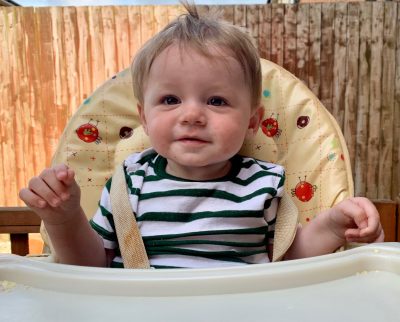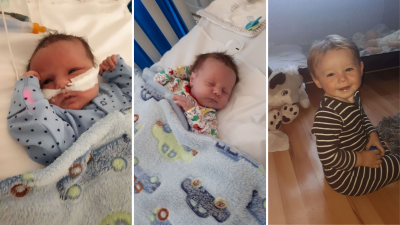Noah’s story

It isn’t just a coincidence that little Noah Harvey shares his name with the children’s hospital for Wales. He was given it because, without it, he wouldn’t be the lively little bundle of fun he is today.
The youngest of five children, his parents Kate and Lee, didn’t even know that Noah’s was on his way until Kate was 22 weeks pregnant. Sadly at the same time they also found out that their baby had a suspected heart condition called TGA. Kate says she spent the two weeks waiting to be referred to a heart specialist blaming herself and hoping against hope that someone had made a mistake. But further tests during that first visit to meet Dr Uzun at the fetal medicine unit confirmed the diagnosis. The main arteries to the baby’s heart were the wrong way around meaning that, outside of the womb it would fail to do its essential task – oxygenate their baby’s blood. The good news was that the condition was operable and Kate was booked in for an early induction in Bristol on 8 February where the baby would then go for corrective surgery soon after.
But baby Noah had other ideas. On the 5 February, just half an hour after dad, Lee, had clocked off to start his paternity leave, Kate’s waters broke. She says: “I completely panicked. I knew from experience that my labours were quick and standing there in my living room I knew that if the baby came there and then without the right support around him, he wouldn’t make it. I rang the Heath who told me to come straight to the delivery ward and by the time we arrived the neonatal intensive care unit team were there waiting. Noah was born blue at 1:15am and whisked off immediately before I even had a chance to look at him. I got to see him briefly a while later on NICU where he was being cared for while they waited for a bed to become available for his operation in Bristol. I felt reassured as soon as I got there because everything was very calm and under control. But I quickly came to learn that NICU babies can take a turn for the worst very quickly.”
At 10am, Kate was called back up to the unit to be greeted by a scene which she says she can only describe as ‘terrifying’. There were 20 people around her baby’s cot including their consultant Dr Uzun. He explained that Noah’s heart rate had rocketed to 200 and that if they were unable to stabilise Noah, he may need to perform a procedure to stabilise her baby there on the ward, before being transferred to Bristol.
Kate says: “I felt sick with helplessness. I’m not really the praying type but I prayed more that morning than I have in my entire life. I had to sign a consent form saying that the procedure my new son would need to save his life also carried a risk of death and at that point I hadn’t even held him!”
Thankfully, Dr Uzun and the NICU team did stabilise Noah and he was well enough to be taken to Bristol. Once there, he underwent a balloon septostomy – a temporary measure to try and improve the oxygen levels in his blood. Kate saw a huge improvement in Noah after that and they now just needed to wait until he was stable enough to undergo the major surgery he needed. But things didn’t go as well as hoped and Noah’s saturation levels kept dropping to worryingly low levels.
Finally on the 15th of February, with Noah seeming to have stabilised, Kate handed her ten day old baby over for his operation. She says: “It was the longest most draining day of my whole life. Giving this tiny baby to the surgeons knowing what they were about to do was indescribably hard. After eight hours a surgeon came to tell us that there had been complications. They’d had to stop Noah’s heart and put him on bypass twice during the operation and though he seemed ok now, they’d left his chest open in case they needed to perform surgery again. I was so frightened that I couldn’t breathe and though I was desperate to see him, I also almost felt too scared at the prospect of what I would find when I did.”

It was initially expected that Noah would be well enough to go home within the week but in those days after surgery in Kate’s own words “everything that could go wrong did go wrong”. The medical team struggled to stabilise Noah and at five days post-surgery he had to undergo another procedure to drain a build up of fluid in his chest. He was heavily sedated, attached to a ventilator and placed on a cooling mat, something that Kate says was particularly difficult because not only was Noah very still and covered in wires, he was also cold to touch.
But, very gradually, Noah did recover. After two and a half weeks he was well enough to go from intensive care to high dependency and finally at four weeks and three days old, he went home for the very first time. But Kate was concerned that Noah wasn’t feeding right and over the following week his breathing became increasingly more rapid. Kate rang an ambulance and Noah was rushed to the Noah’s Ark Children’s Hospital for Wales where the cardiac team performed an echo scan on his heart. Fortunately, Noah’s newly fixed heart was fine but the complications he’d experienced during his first month of life had left his lungs damaged, making him more prone to infection.
Noah was placed under the care of Dr Thia from the children’s hospital’s respiratory team and during that first winter he was admitted several times in an emergency with bronchiolitis. Kate says it was a challenging time for the family, particularly her youngest daughter who became fearful of waking up one morning with her mum and baby brother gone. Kate and Noah could be in hospital for several weeks during those early days. Thankfully though, as Noah is growing, so is the strength of his lungs and the hospital stays are slowly becoming less frequent.
Nevertheless though, Kate says that the last few years have been tough: “Having a baby you know will be born with a heart defect is frightening and I worried every day before during and after having Noah. Seeing your child then fight for his life really isn’t an easy experience but now Noah is a little older and a lot stronger it is getting easier. The worry is always there but we’re very fortunate to have our cardiac nurse, Claire, who is only ever a phone call away. If I ever have any worries or concerns, and there have been many, she’ll always do everything she can to help.
“We hadn’t originally planned to find out the baby’s sex when I first found out I was pregnant but after the stress of the scan we just felt like we had to know. It wasn’t until after Noah was born though that the name came to us. As his dad always says, if it wasn’t for the hospital and the fantastic work they do, our boy may not have been so lucky.”
Your support has helped us to fund specialised echo machines that allow the cardiac team here at the hospital to detect monitor and plan the best course of treatment for children like Noah. For more information on ways to support our work visit click here







